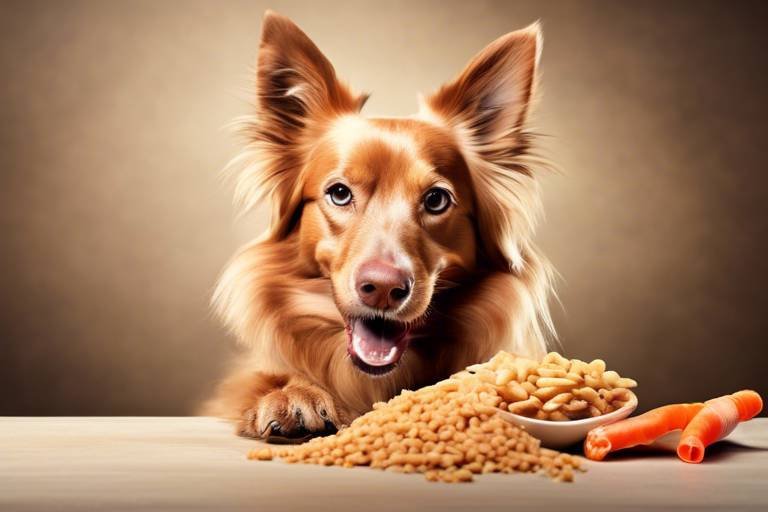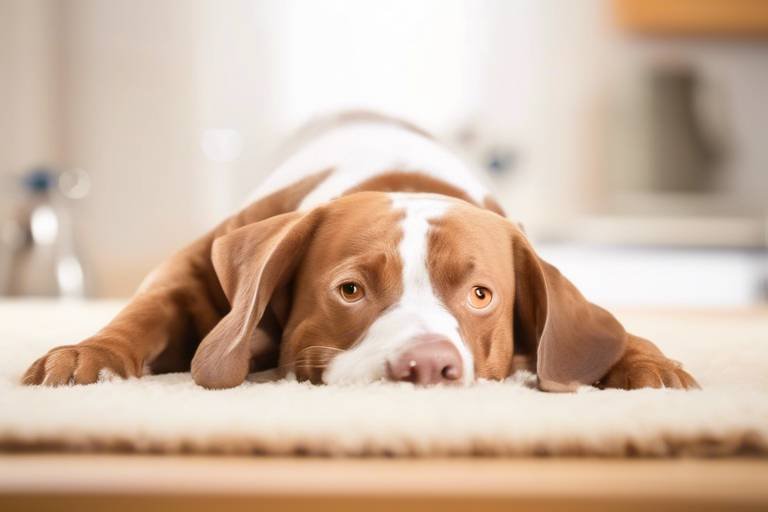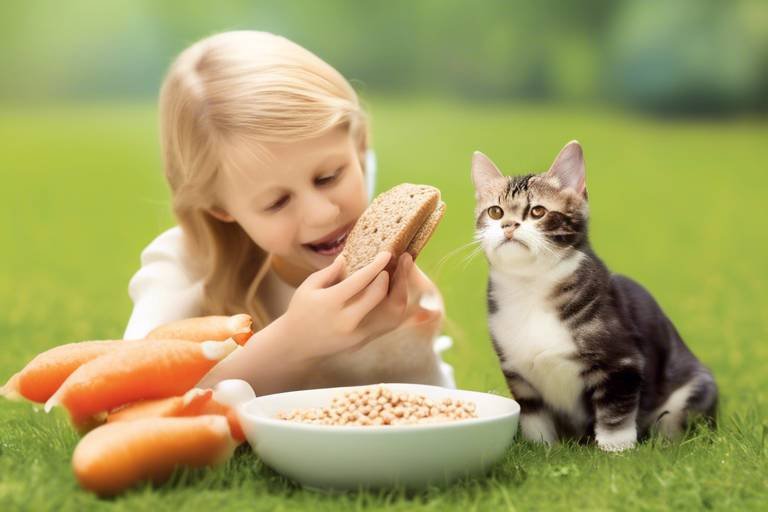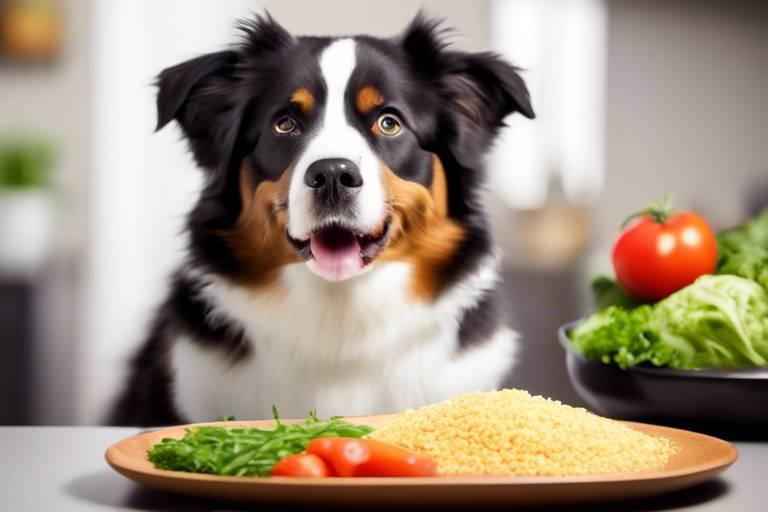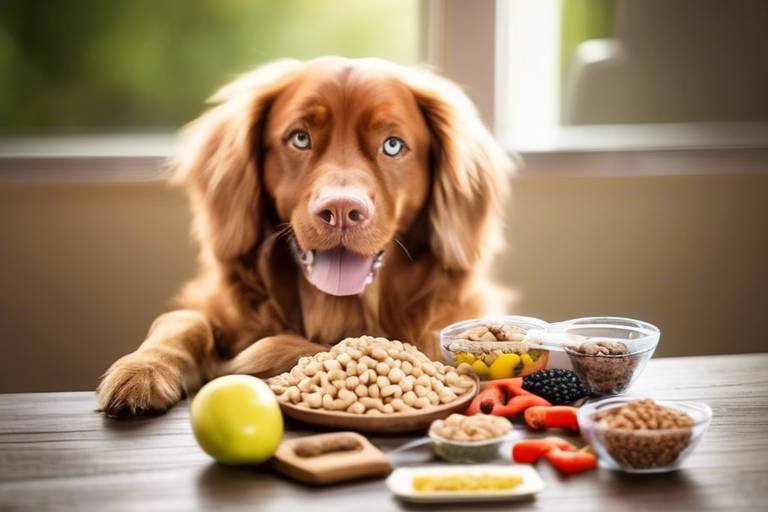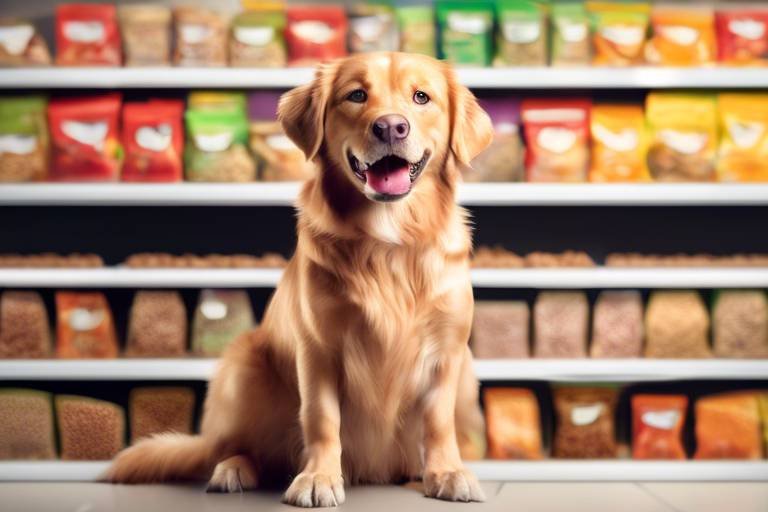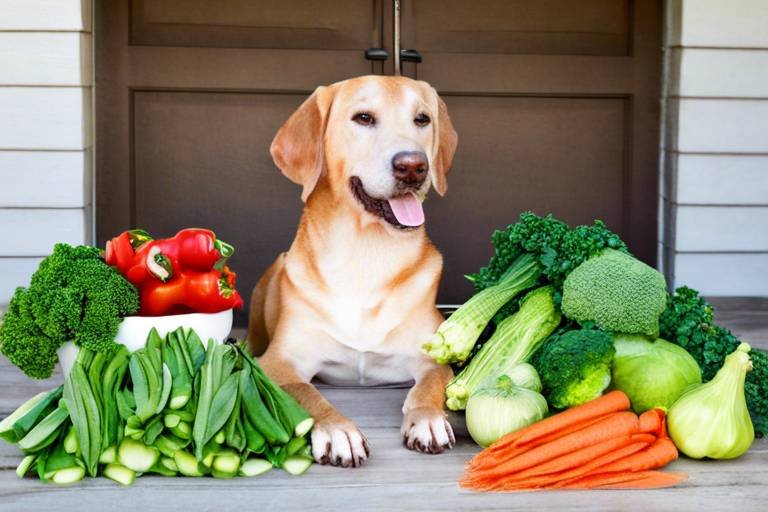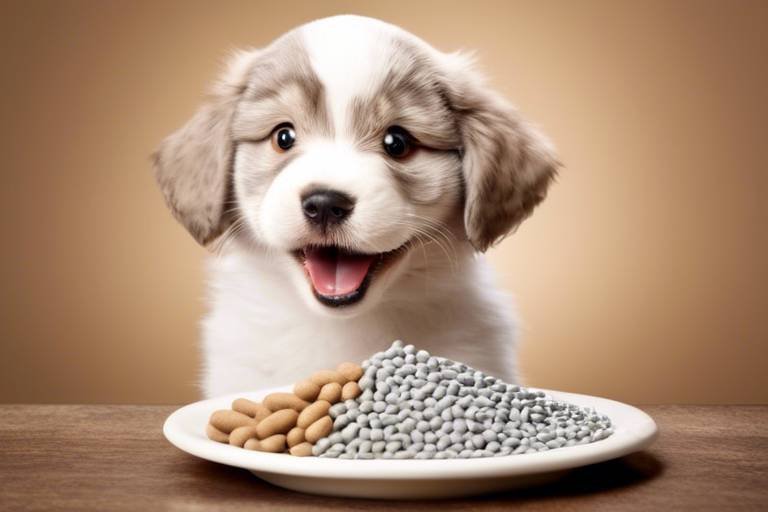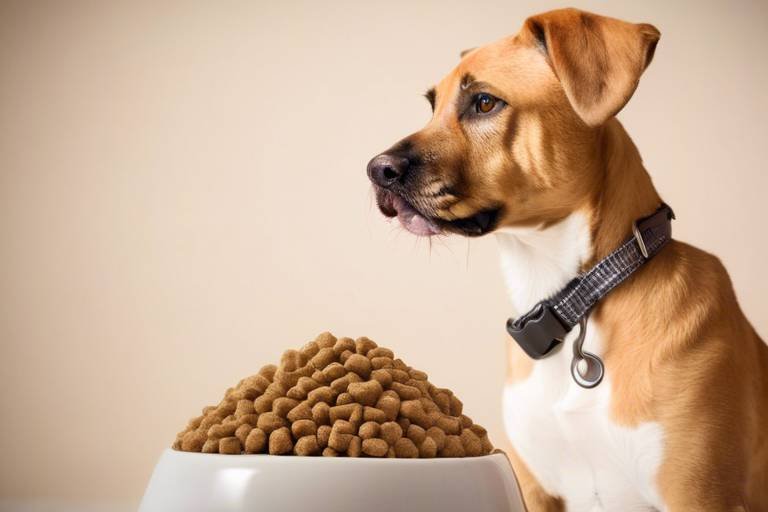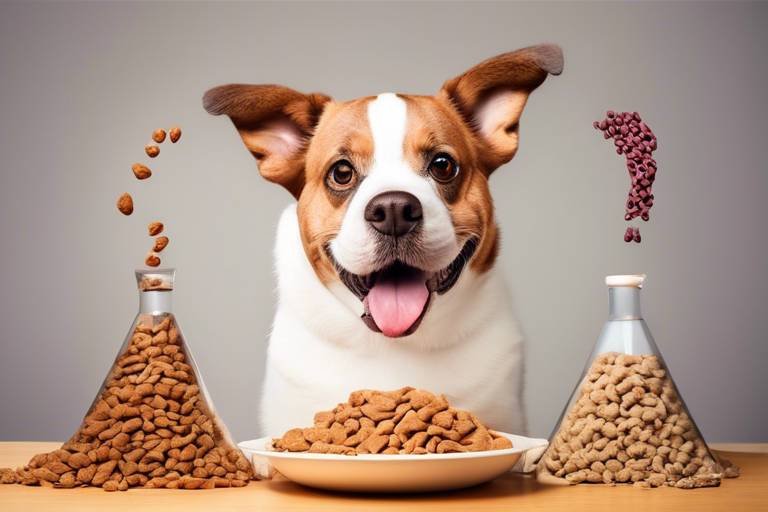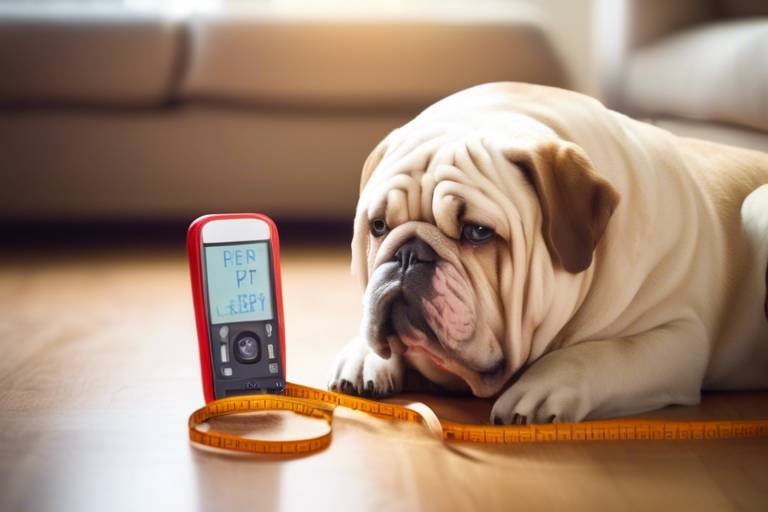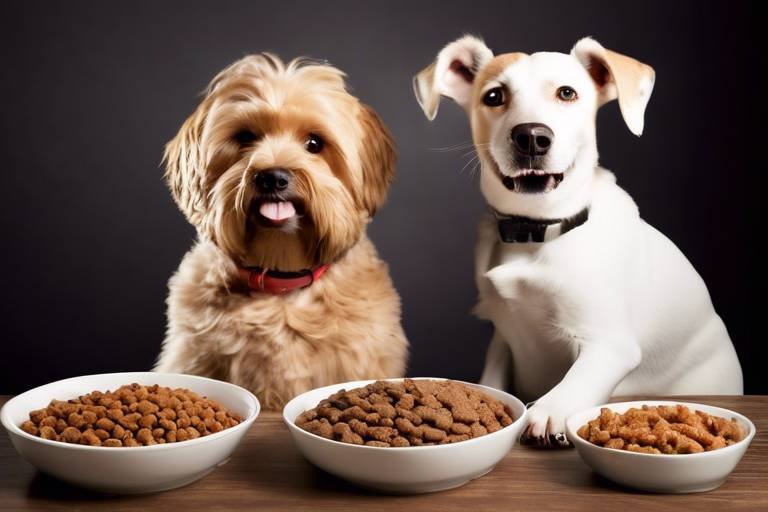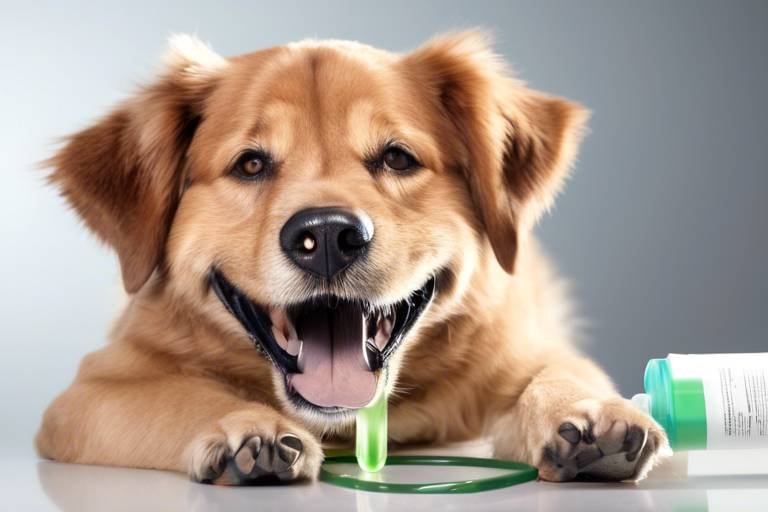How to Help Your Pet Maintain a Healthy Digestive System
Maintaining a healthy digestive system for your furry friend is not just a matter of feeding them the right food; it’s a holistic approach that involves understanding their needs, recognizing signs of distress, and taking proactive measures. Just like us, pets can experience digestive issues that may lead to discomfort and serious health problems if left unchecked. So, how can you ensure your pet's tummy is always happy? Let's dive into some effective strategies!
To appreciate the importance of a healthy digestive system, it’s essential to understand how digestion works in pets. When your pet eats, the food travels through a complex system involving the mouth, esophagus, stomach, and intestines. Each organ plays a crucial role in breaking down food into nutrients that your pet can absorb. For instance, the stomach uses acids and enzymes to break down proteins, while the intestines are where most nutrient absorption occurs. If any part of this system is out of whack, it can lead to digestive issues. Think of it like a well-oiled machine; if one cog stops turning, the whole system can falter.
Being able to recognize the signs of digestive problems in your pet is key to early intervention. Common signs to watch for include:
- Vomiting: This can range from occasional to frequent and may indicate something is off.
- Diarrhea: Loose stools can be a sign of dietary indiscretion or underlying health issues.
- Changes in Appetite: If your pet suddenly refuses to eat or seems ravenous, it’s worth investigating.
- Abdominal Pain: Signs of discomfort, such as whining or reluctance to be touched, could indicate digestive distress.
Recognizing these symptoms early on can make a significant difference in your pet's health and well-being.
There are various digestive disorders that can afflict pets, and understanding them can help you provide better care. Some common issues include:
- Irritable Bowel Syndrome (IBS): This condition can cause chronic diarrhea or constipation and is often linked to stress or dietary changes.
- Pancreatitis: Inflammation of the pancreas can occur due to a high-fat diet, leading to severe pain and vomiting.
- Gastroenteritis: This is the inflammation of the stomach and intestines, often caused by infections or dietary indiscretion.
Understanding these disorders can help you recognize when your pet might need veterinary attention.
Preventive measures can significantly reduce the risk of digestive disorders in pets. Here are some strategies to consider:
- Regular Exercise: Keeping your pet active promotes healthy digestion and can prevent obesity.
- Consistent Feeding Schedule: Feeding your pet at the same times each day can help regulate their digestive system.
- Monitor Food Intake: Keeping an eye on what and how much your pet eats can prevent overeating and dietary issues.
Implementing these simple habits can lead to a longer, healthier life for your pet.
If your pet experiences digestive issues, various treatment options are available. Depending on the severity and cause of the problem, you may need to consider:
- Dietary Changes: Switching to a specialized diet can help manage certain digestive disorders.
- Medications: Your veterinarian may prescribe medications to alleviate symptoms or treat underlying conditions.
- Probiotics: These can enhance gut health and restore balance to your pet's digestive system.
Understanding these options allows you to make informed decisions about your pet's health.
A balanced diet is crucial for maintaining your pet’s digestive health. Just like humans, pets require specific nutrients to support their bodily functions. Foods rich in fiber can aid digestion and prevent constipation, while those high in protein support muscle health. Think of your pet's diet as the foundation of a house; if the foundation is weak, everything else is at risk. Therefore, ensuring your pet receives a well-rounded diet can promote gut health and prevent a myriad of issues.
In addition to a balanced diet, certain supplements can enhance your pet's digestive health. Probiotics, for example, are beneficial bacteria that can help restore balance in the gut, especially after antibiotic treatment or during times of stress. Digestive enzymes can also aid in breaking down food more effectively, making it easier for your pet to absorb nutrients. These supplements can be a game-changer in promoting overall well-being.
Selecting the appropriate food tailored to your pet's specific needs is essential. Consider factors such as age, breed, and any existing health conditions. For instance, senior pets may require food that is easier to digest, while active breeds might need higher protein content. Always read labels and consult with your veterinarian to find the best options for your furry friend.
Regular consultations with a veterinarian are vital for monitoring your pet's digestive health. Your vet can provide personalized advice on diet and care, helping you identify potential issues before they escalate. Think of your veterinarian as your pet's health coach; they have the knowledge and experience to guide you in making the best choices for your beloved companion.
Q: How often should I feed my pet?
A: It’s generally recommended to feed adult pets two meals a day, while puppies and kittens may require more frequent feedings. Always consult your vet for personalized advice.
Q: What should I do if my pet has diarrhea?
A: Monitor their condition closely. If it persists for more than a day, consult your veterinarian as it may indicate a more serious issue.
Q: Are there any foods I should avoid giving my pet?
A: Yes, foods like chocolate, grapes, onions, and garlic can be toxic to pets. Always research before introducing new foods.
Q: How can I tell if my pet is getting enough fiber?
A: A good indicator is the consistency of their stools. If they are too hard or too soft, it may be time to adjust their fiber intake.

Understanding Pet Digestion
Understanding how your pet digests food is essential for maintaining their overall health and well-being. Just like us, pets have a complex digestive system that breaks down food into nutrients their bodies can absorb. This process begins in the mouth, where enzymes in saliva start to break down carbohydrates. From there, food travels down the esophagus and into the stomach, where it meets a highly acidic environment that further aids digestion.
The stomach is a powerhouse, churning food and mixing it with gastric juices. This mixture then moves into the small intestine, where most nutrient absorption occurs. Here, enzymes from the pancreas and bile from the liver play crucial roles. They help break down proteins, fats, and carbohydrates into smaller molecules that can be absorbed into the bloodstream. The remaining waste then passes into the large intestine, where water is reabsorbed, and the body prepares to eliminate the waste.
It's fascinating to note that each organ in this digestive journey has a specific role. For instance, the pancreas not only produces digestive enzymes but also regulates blood sugar levels. This multi-tasking organ is vital for your pet's health! If any part of this system is disrupted, it can lead to digestive issues, which can manifest in various ways such as vomiting, diarrhea, or even lethargy.
To illustrate this process, let's take a look at a simple table summarizing the key organs involved in your pet's digestion:
| Organ | Function |
|---|---|
| Mouth | Begins the breakdown of food with chewing and saliva. |
| Stomach | Mixes food with gastric juices for further breakdown. |
| Small Intestine | Primary site for nutrient absorption with help from pancreatic enzymes and bile. |
| Large Intestine | Reabsorbs water and prepares waste for elimination. |
Recognizing the importance of each organ in your pet's digestive system can help you understand why a balanced diet and regular veterinary check-ups are essential. Just like a well-oiled machine, each part relies on the others to function correctly. If one component is out of whack, the entire system can suffer, leading to discomfort and health issues.
In conclusion, being aware of how your pet's digestive system works allows you to make informed choices about their diet and care. By ensuring they have a healthy digestive environment, you're not just feeding them; you're providing them with the tools they need to thrive. So, the next time you fill their bowl, remember that you're fueling a complex system that deserves your attention and care!

Signs of Digestive Issues
As a pet owner, you want nothing but the best for your furry friend, and that includes their health. However, just like us, pets can experience digestive issues that can lead to discomfort and more serious health problems if left unchecked. It's essential to be vigilant and recognize the early on. So, what should you be looking for? Well, let’s dive into some common symptoms that could indicate your pet is not feeling their best.
One of the most noticeable signs is vomiting. If your pet is throwing up regularly, it might be their body’s way of signaling that something is off in their digestive system. But don’t panic just yet! A single episode of vomiting might not be a cause for concern, especially if they seem otherwise healthy. However, if the vomiting persists or is accompanied by other symptoms, it’s time to take action.
Another red flag is diarrhea. While it’s not uncommon for pets to have an occasional loose stool, persistent diarrhea can lead to dehydration and may indicate a more serious condition. If your pet’s bathroom habits change drastically, it’s crucial to observe their behavior closely. Are they lethargic? Have they lost their appetite? These could be signs of an underlying issue.
Speaking of appetite, changes in eating habits can be a significant indicator of digestive distress. If your pet suddenly becomes a picky eater or refuses to eat altogether, it’s worth investigating. Pets can’t tell us when something hurts, but their behavior often speaks volumes. A sudden decrease in appetite could mean they’re experiencing discomfort or pain related to their digestive system.
In addition to these symptoms, you might also notice excessive gas or bloating. If your pet seems to be passing gas more than usual or has a distended belly, these could be signs of gastrointestinal upset. Think of it like a balloon that’s been overfilled; it’s uncomfortable and needs to release some pressure. If your pet is showing these signs along with any others mentioned, it’s time to consult your veterinarian.
Finally, keep an eye on your pet’s overall behavior. If they seem unusually lethargic, withdrawn, or irritable, these changes in personality could be linked to digestive issues. Pets are creatures of habit, and any significant changes in their demeanor should not be ignored. Just like us, they can feel unwell, and their mood may reflect that discomfort.
In summary, being aware of the signs of digestive issues in your pet can help you catch potential problems early. Here’s a quick recap of the key symptoms to watch for:
- Frequent vomiting
- Persistent diarrhea
- Changes in appetite
- Excessive gas or bloating
- Unusual lethargy or irritability
By staying vigilant and proactive, you can help ensure your pet maintains a healthy digestive system and enjoys a happy, active life. If you notice any of these signs, don’t hesitate to reach out to your veterinarian for guidance and support.
Q: What should I do if my pet shows signs of digestive issues?
A: If your pet exhibits any signs of digestive problems, it’s best to consult your veterinarian as soon as possible. Early intervention can prevent more serious health issues.
Q: Are certain breeds more prone to digestive issues?
A: Yes, some breeds are more susceptible to digestive disorders due to their anatomical structure or genetic predispositions. It’s essential to research your pet’s breed and consult with your vet about any specific risks.
Q: Can a change in diet cause digestive problems?
A: Absolutely! Sudden changes in diet can upset your pet’s stomach. It’s always best to transition to a new food gradually over a week or so to avoid digestive upset.
Common Digestive Disorders
When it comes to our furry companions, their digestive health is paramount. Just like humans, pets can suffer from various digestive disorders that can affect their overall well-being. Understanding these common issues is crucial for pet owners, as early detection can lead to better outcomes. Let's dive into some of the most prevalent digestive disorders that pets may face.
One of the most frequently diagnosed conditions is irritable bowel syndrome (IBS). This disorder is characterized by chronic inflammation of the gastrointestinal tract, leading to symptoms such as diarrhea, vomiting, and abdominal discomfort. Pets with IBS may also experience changes in appetite and weight loss. It's essential to monitor your pet's eating habits closely, as their diet can significantly impact the severity of IBS.
Another common digestive issue is pancreatitis, which occurs when the pancreas becomes inflamed. This condition can happen suddenly (acute) or develop over time (chronic). Symptoms of pancreatitis may include severe abdominal pain, lethargy, and a sudden change in appetite. If your pet shows signs of distress or refuses to eat, it’s vital to seek veterinary care immediately. The treatment for pancreatitis often involves a strict diet and, in severe cases, hospitalization.
Additionally, gastroenteritis is a term that refers to inflammation of the stomach and intestines. This condition can be caused by infections, dietary indiscretion, or even stress. Pets with gastroenteritis may exhibit symptoms like vomiting, diarrhea, and dehydration. It's essential to keep your pet hydrated, as dehydration can quickly become a serious concern. In some cases, a veterinarian may recommend a bland diet or medications to soothe the digestive tract.
Other digestive disorders include food allergies and intestinal parasites. Food allergies can lead to gastrointestinal upset, resulting in symptoms such as vomiting, diarrhea, and skin irritations. On the other hand, intestinal parasites, like worms, can cause a range of issues from weight loss to bloating and discomfort. Regular veterinary check-ups and stool tests can help identify these issues early on.
To sum up, being aware of these common digestive disorders can empower pet owners to act swiftly and provide the necessary care. If you notice any unusual behavior or symptoms in your pet, don't hesitate to consult your veterinarian. Remember, your furry friend relies on you to keep them healthy and happy!
- What are the signs of digestive disorders in pets? Look for symptoms such as vomiting, diarrhea, changes in appetite, and lethargy.
- How can I prevent digestive issues in my pet? Providing a balanced diet, regular exercise, and routine veterinary check-ups can help maintain digestive health.
- When should I consult a veterinarian? If your pet shows persistent symptoms like vomiting or diarrhea, or if there are sudden changes in their behavior or appetite, it’s best to seek professional advice.
Preventive Measures
When it comes to ensuring your pet maintains a healthy digestive system, prevention is truly the best medicine. Just like humans, our furry friends benefit from a proactive approach to their health. So, what can you do to keep those digestive woes at bay? Here are some essential preventive measures that can make a world of difference.
First and foremost, diet plays a crucial role in your pet's digestive health. Selecting high-quality, balanced food tailored to your pet's specific needs is akin to giving them a solid foundation for a healthy life. Look for foods rich in fibers, proteins, and essential nutrients, while avoiding fillers and artificial additives. It's like choosing a gourmet meal over fast food for yourself—your pet will thrive on the right nutrition!
Regular exercise is another key element in maintaining digestive health. Just as a good workout can keep us feeling fit and energized, it helps pets process food more efficiently. Aim for daily walks, playtime, or even engaging in fun activities like fetch or agility training. Think of it as a way to keep their digestive system in tip-top shape, much like how we need to keep our engines running smoothly.
It’s also vital to establish a consistent feeding schedule. Pets thrive on routine, and feeding them at the same times each day can help regulate their digestive processes. This predictability can prevent overeating and minimize the risk of digestive upset. Imagine how you feel when you skip meals or eat at odd hours—it’s not pleasant, right? Your pet feels the same way!
Additionally, regular visits to the veterinarian for check-ups can catch potential issues before they escalate. Your vet can provide insights into your pet's specific dietary needs, recommend appropriate supplements, and monitor their overall health. Think of your vet as a coach guiding you and your pet toward optimal health—after all, prevention is always better than cure!
Lastly, be mindful of any sudden changes in your pet’s environment or routine. Stress can wreak havoc on their digestive health, leading to issues like diarrhea or constipation. Whether it’s a new pet in the house, a change in your work schedule, or even a move to a new home, try to ease the transition for your furry friend. Just as we need time to adjust to changes, our pets do too!
By implementing these preventive measures, you’re not just safeguarding your pet's digestive health; you’re enhancing their overall quality of life. Remember, a happy gut leads to a happy pet!
- What are the signs of a healthy digestive system in pets?
A healthy digestive system typically shows signs such as regular bowel movements, healthy appetite, and good energy levels. - How often should I take my pet to the vet for check-ups?
It’s recommended to take your pet for a veterinary check-up at least once a year, or more frequently if they have specific health concerns. - Can I give my pet human food?
While some human foods are safe for pets, many can be harmful. Always check with your veterinarian before introducing new foods. - What supplements are beneficial for my pet's digestive health?
Probiotics and digestive enzymes are commonly recommended supplements that can help improve gut health.
Treatment Options
When it comes to addressing your pet's digestive issues, understanding the various treatment options available is crucial. Just like humans, pets can experience a range of digestive problems, and the right approach can make all the difference. Treatment can vary depending on the specific condition, its severity, and your pet's overall health. So, what are the most effective options?
First and foremost, dietary changes are often the first line of defense. Many digestive issues can be alleviated by switching to a high-quality, easily digestible food. This may involve transitioning to a specialized diet that is low in fat or specifically formulated for sensitive stomachs. Always consult your veterinarian before making any significant changes to your pet's diet, as they can recommend the best options tailored to your pet's needs.
In addition to dietary adjustments, medications may be necessary for more severe cases. For example, if your pet is suffering from conditions like irritable bowel syndrome or pancreatitis, your veterinarian might prescribe anti-inflammatory medications or antibiotics to help manage symptoms. It's essential to follow your vet's instructions carefully and monitor your pet for any side effects.
Another important aspect of treatment is the use of supplements. Probiotics and digestive enzymes can be beneficial in restoring balance to your pet's gut flora and improving digestion. These supplements can help break down food more effectively, enhancing nutrient absorption and promoting overall gut health. However, not all pets will require them, so it's always best to discuss supplementation with your vet.
Finally, regular veterinary check-ups are vital for maintaining your pet's digestive health. These visits allow your veterinarian to monitor any ongoing issues, adjust treatment plans as needed, and catch potential problems before they escalate. Think of your vet as your pet's health coach, guiding you through the maze of dietary options and treatment possibilities.
In summary, the treatment options for your pet's digestive issues can be varied and multifaceted. From dietary changes to medications and supplements, each approach plays a critical role in ensuring your furry friend stays healthy and happy. Remember, your veterinarian is your best resource for navigating these options effectively.
- What are the signs my pet needs to see a veterinarian for digestive issues? Look for symptoms such as vomiting, diarrhea, lethargy, or changes in appetite.
- Can I give my pet human medications for digestive problems? No, always consult your veterinarian before giving your pet any medications, as many human drugs can be toxic to pets.
- How can I prevent digestive issues in my pet? A balanced diet, regular exercise, and routine veterinary visits can significantly reduce the risk of digestive problems.
Importance of Diet
When it comes to our furry friends, diet plays a crucial role in maintaining a healthy digestive system. Just like humans, pets require a balanced intake of nutrients to thrive. Imagine your pet's body as a finely tuned engine; without the right fuel, it simply won't run efficiently. A well-rounded diet not only supports digestion but also enhances overall health, keeps energy levels up, and strengthens the immune system. So, what does a balanced diet look like for pets?
First and foremost, it’s essential to understand that pets have different dietary needs based on their species, age, and activity level. For example, a growing puppy has different nutritional requirements compared to a senior dog. The right balance of proteins, fats, carbohydrates, vitamins, and minerals is vital. Here’s a quick breakdown of what you should consider:
| Nutrient | Function | Sources |
|---|---|---|
| Proteins | Builds and repairs tissues | Meat, fish, eggs |
| Fats | Provides energy and supports cell structure | Fish oil, chicken fat, flaxseed |
| Carbohydrates | Source of energy and aids digestion | Rice, oats, sweet potatoes |
| Vitamins | Supports various bodily functions | Fruits, vegetables, fortified foods |
| Minerals | Essential for bone health and metabolic processes | Meat, dairy, leafy greens |
Another important aspect to consider is the quality of the food you choose. Not all pet foods are created equal. Some commercial brands may contain fillers and artificial additives that can disrupt your pet's digestive health. It's crucial to read labels and select high-quality food that lists real meat as the first ingredient. Think of it this way: would you want to fuel your body with junk food? Neither does your pet!
Moreover, portion control is key. Overfeeding can lead to obesity, which is a significant risk factor for various digestive disorders. It's always a good idea to consult with your veterinarian to determine the appropriate serving sizes and feeding schedules tailored to your pet's specific needs. Remember, a happy pet is a healthy pet, and it all starts with what goes into their bowl!
Incorporating fresh fruits and vegetables can also be a game-changer. These natural foods provide essential vitamins and fiber that can aid digestion. Just make sure to research which fruits and veggies are safe for your pet. For instance, while carrots and blueberries are fantastic treats, grapes and onions can be toxic. Always keep your pet's safety in mind when introducing new foods.
In conclusion, a well-balanced diet is the cornerstone of your pet's digestive health. By being mindful of what you feed them, you can help prevent digestive issues and promote a longer, healthier life. After all, your pet relies on you to make the best choices for their well-being, so why not ensure they’re getting the best nutrition possible?
- How often should I feed my pet? It's generally recommended to feed adult pets twice a day, while puppies may require three to four meals.
- Can I give my pet human food? Some human foods are safe for pets, but always check which ones are appropriate and avoid toxic foods.
- What signs indicate my pet may have dietary issues? Look for symptoms like vomiting, diarrhea, or changes in appetite and energy levels.

Beneficial Supplements
When it comes to keeping your furry friend in tip-top shape, can play a crucial role in maintaining their digestive health. Just like humans, pets can sometimes benefit from a little extra help to ensure their bodies are functioning optimally. Think of these supplements as the cherry on top of a well-balanced diet, enhancing your pet's overall well-being and digestive efficiency.
One of the most popular types of supplements for pets is probiotics. These are live bacteria that, when consumed in adequate amounts, can provide health benefits. Probiotics help to balance the gut microbiome, which is essential for digestion and nutrient absorption. They can be particularly beneficial for pets recovering from gastrointestinal issues or those on antibiotics, as these medications can disrupt the natural balance of bacteria in the gut.
Another supplement worth considering is digestive enzymes. These enzymes assist in breaking down food into nutrients that can be easily absorbed by the body. Sometimes, pets may not produce enough digestive enzymes on their own, leading to issues like bloating, gas, or even diarrhea. By adding digestive enzymes to your pet's diet, you can help ensure they are getting the most out of their meals.
Here’s a quick overview of some beneficial supplements and their roles:
| Supplement | Benefits |
|---|---|
| Probiotics | Supports gut health, balances gut flora, aids in recovery from gastrointestinal issues. |
| Digestive Enzymes | Helps break down food, improves nutrient absorption, reduces digestive discomfort. |
| Fiber Supplements | Promotes regular bowel movements, aids in weight management, helps with constipation. |
| Omega-3 Fatty Acids | Supports inflammation reduction, promotes healthy skin and coat, aids in overall health. |
Moreover, fiber supplements can also be beneficial, especially for pets that struggle with constipation or irregular bowel movements. Fiber can help regulate digestion by adding bulk to the stool, making it easier for your pet to eliminate waste. However, it's important to introduce fiber gradually into their diet to avoid any sudden digestive upset.
And let's not forget about omega-3 fatty acids, which are known for their anti-inflammatory properties. These can be particularly helpful for pets with inflammatory bowel disease or those who suffer from allergies that affect their digestive system. Omega-3s can also contribute to a shiny coat and healthy skin, making them a great addition to your pet's diet.
While supplements can offer significant benefits, it’s essential to remember that they should not replace a balanced diet. Always consult with your veterinarian before introducing any new supplements to ensure they are appropriate for your pet's specific needs and health conditions. Your vet can help you navigate the world of pet supplements, ensuring that you choose the right ones that complement your pet's diet and lifestyle.
In summary, beneficial supplements like probiotics, digestive enzymes, fiber, and omega-3 fatty acids can enhance your pet's digestive health and overall well-being. By taking a proactive approach to your pet's nutrition, you can help them lead a happier, healthier life.
- What are probiotics, and how do they help my pet?
Probiotics are live bacteria that can help maintain the natural balance of organisms in the intestines, improving digestion and overall gut health. - Can I give my pet human supplements?
It's best to avoid giving your pet human supplements without consulting your veterinarian, as some ingredients can be harmful to pets. - How do I know if my pet needs supplements?
If your pet shows signs of digestive issues, has a poor appetite, or is recovering from illness, it may benefit from supplements. Always consult your vet for personalized advice.
Choosing the Right Food
When it comes to your furry friend’s health, is like picking the best fuel for a high-performance engine. Just as a car needs quality petrol to run smoothly, your pet requires a balanced diet tailored to their unique needs to maintain optimal digestive health. But how do you navigate the sea of pet food options available today? It can feel overwhelming, but understanding a few key factors can make all the difference.
First and foremost, consider your pet's age, size, and activity level. Puppies and kittens have different nutritional needs compared to adult or senior pets. For instance, a growing puppy might require more protein and calories to support their rapid growth, while older pets may benefit from a diet lower in calories but higher in fiber to aid digestion. Additionally, larger breeds may have specific dietary requirements to prevent joint issues, while smaller breeds might need more concentrated nutrition.
Next, take a closer look at the ingredients list on the pet food packaging. The first few ingredients should ideally be high-quality sources of protein, such as chicken, beef, or fish. Avoid foods that list vague terms like "meat by-products" or "animal fat." These can be red flags indicating lower-quality ingredients. Instead, opt for foods that include whole grains, fruits, and vegetables, which provide essential nutrients and fiber necessary for good digestion.
Another important aspect is to be aware of any food allergies or sensitivities your pet may have. Just like us, pets can experience adverse reactions to certain ingredients. Common allergens include beef, dairy, and wheat. If you notice symptoms such as itching, gastrointestinal upset, or changes in behavior after feeding, it might be time to consult your veterinarian and consider a hypoallergenic diet.
It’s also worth mentioning the difference between dry kibble and wet food. Each has its pros and cons. Dry kibble is convenient, helps keep teeth clean, and is usually more affordable. On the other hand, wet food can be more palatable and hydrating, which is especially beneficial for pets that don’t drink enough water. Some pet owners even choose a combination of both to provide variety and balance.
Lastly, don’t forget about special dietary needs. If your pet has been diagnosed with any health issues, such as diabetes or kidney disease, your veterinarian may recommend a specialized diet to help manage their condition. Following these recommendations closely can significantly improve your pet's quality of life.
In summary, choosing the right food for your pet is a crucial step in maintaining their digestive health. By considering their individual needs, inspecting ingredient quality, being mindful of allergies, and possibly integrating different food types, you can help ensure your furry friend thrives. Remember, a happy pet often starts with a healthy diet!
- What should I look for in pet food? Always check for high-quality protein sources as the main ingredients, avoid fillers and artificial additives, and consider your pet's specific dietary needs.
- Can I mix wet and dry food? Yes, many pet owners find that combining wet and dry food provides a balanced diet and keeps their pets interested in their meals.
- How can I tell if my pet is allergic to their food? Common signs of food allergies include itching, gastrointestinal upset, and changes in behavior. If you suspect an allergy, consult your veterinarian.
- Should I change my pet's food as they age? Yes, pets often have different nutritional needs at various life stages, so it's important to adjust their diet accordingly.
Consulting Your Veterinarian
When it comes to your pet's health, is not just a good idea; it's essential. Think of your vet as the captain of your pet's health journey, steering you through the often turbulent waters of pet care. Regular check-ups can help catch potential digestive issues before they snowball into something more serious. Just like we schedule our own doctor visits, your furry friend deserves the same attention!
During these visits, your veterinarian will conduct a thorough examination, which may include:
- Assessing your pet's weight and body condition
- Checking for signs of dehydration or distress
- Reviewing your pet's dietary habits and any changes in appetite
- Performing blood tests or other diagnostic procedures if necessary
But it's not just about the physical examination; it's also a time for you to voice any concerns you may have. Have you noticed your pet acting differently? Maybe they've been a bit more lethargic or are having trouble with their bathroom habits. These observations are crucial! Your vet can provide tailored advice based on your pet's specific symptoms and history.
Moreover, your veterinarian can guide you on the best dietary choices for your pet. They can recommend specific foods or supplements that can enhance digestive health, ensuring your pet gets the nutrients they need to thrive. This personalized advice is invaluable, as every pet is unique and may have different dietary requirements.
Remember, maintaining a healthy digestive system is a team effort between you and your vet. Regular consultations not only help in monitoring your pet's health but also empower you with knowledge and strategies to keep your pet feeling their best. So, don’t hesitate to reach out to your veterinarian whenever you have questions or concerns; after all, a healthy pet is a happy pet!
- How often should I take my pet to the vet? It's generally recommended to visit the vet at least once a year for a check-up, but older pets or those with health issues may need more frequent visits.
- What should I do if I notice changes in my pet's digestion? If you observe vomiting, diarrhea, or changes in appetite, contact your veterinarian as soon as possible for advice and potential treatment.
- Are there specific diets recommended for pets with digestive issues? Yes, your vet can recommend specialized diets that are easier on your pet's digestive system, often including easily digestible ingredients.
Frequently Asked Questions
- What are the signs of digestive issues in pets?
Pets can’t exactly tell us when something’s wrong, but there are some telltale signs you can watch out for. Look for symptoms like vomiting, diarrhea, changes in appetite, or unusual lethargy. If your furry friend seems uncomfortable or is straining to go to the bathroom, these could be red flags that something isn’t right!
- How can I maintain my pet's digestive health?
Maintaining your pet's digestive health is all about balance! Start with a well-rounded diet that’s appropriate for their age, size, and breed. Regular exercise is also crucial, as it helps keep their digestive system moving. Don’t forget those vet check-ups; they can catch potential issues before they become serious!
- What common digestive disorders should I be aware of?
Some common digestive disorders in pets include irritable bowel syndrome, pancreatitis, and gastroenteritis. Each of these can cause discomfort and require different approaches to treatment. Knowing what to look for can help you act quickly if your pet shows any signs of distress.
- Are there specific diets that promote digestive health?
Absolutely! A high-quality diet rich in fiber can work wonders for your pet's gut. Look for foods that include probiotics and digestive enzymes, as these can help break down food more efficiently. Always consult your vet to find the best dietary options tailored to your pet's needs!
- What role do supplements play in digestive health?
Supplements like probiotics can be game-changers for your pet's digestive system! They help balance the good bacteria in the gut, which can improve digestion and boost overall health. Always check with your veterinarian before adding any new supplements to your pet's routine.
- How often should I consult my veterinarian about my pet's digestion?
Regular veterinary check-ups are key! Aim for at least once a year for healthy pets, but if your furry friend has a history of digestive issues, more frequent visits might be necessary. Your vet can provide personalized advice and monitor any changes in your pet's health.

